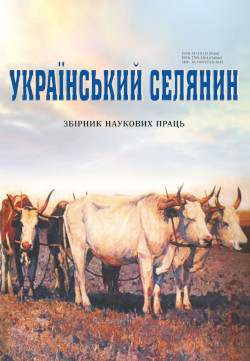Scientific Approaches to the Culture of Farming in Large Farms at the Turn of the 19th–20th centuries
Main Article Content
Abstract
The purpose of the article study is to determine the goals, scope, and effectiveness of the introduction of
scientific approaches introduction to agriculture in large landowners` estates.
Scientific novelty of the research results. The scientific literature has already covered the application and dissemination
of research agricultural practices initiated by the Ministry of Agriculture, country council, agricultural societies, and private
individuals. The scientific novelty of the research results lies in the study of experimental agriculture organization on the farms
of large landowners.
The methodological basis of the study is the principles of scientific objectivity, historicism, and systematicity in synergy
with general scientific (analysis, synthesis, generalization) and special historical (historical-typological, historical-genetic,
historical-biographical) methods.
Conclusions. Research agricultural institutions were intended to raise the overall level of agricultural production. In
the Ukrainian provinces, research agricultural institutions were established in the last quarter of the nineteenth century, and at
the beginning of the twentieth century there were more than 100 of them. Research institutions were aimed at studying natural
conditions that influenced the overall level of agriculture. Several types of research institutions were practiced: research
stations, research fields, research farms, demonstration fields and farms.
Experimental plots were used to test wheat for drought resistance and yield, and to conduct selection work with cereals
and industrial crops, primarily beets. The purpose of the agricultural experiments was to develop the most acceptable field
culture techniques and to meet the needs of specific farms for productive seed material. However, the influence of scientific
approaches to agriculture was not limited to the large farms where they were practiced, but also spread to neighboring peasant farms. The activity of the owners of large estates – L. Simyrenko, F. Falz-Fein, O. Bobrynskyi – was determined not only by economic expediency, but also by the desire for something new, which corresponded to the needs of the time and increased
intensity of management
Article Details
References
Blok, M. (1957). Kharakternye cherty frantsuzskoi agrarnoi istorii. [Characteristic features of
French agrarian history]. Moskva: Izd-vo inostr lit-ry. [in Russian].
Boreiko, V. (1996). Pamiat o Falts-Feine i ego dele. [The memory of Falz-Fein and his
work]. Ocherki o pionerakh okhrany prirody [Essays on Conservation Pioneers]. Tom pervyi. Kіev:
Kyevskyi еkoloho-kulturnуу tsentr. URL: http://ecoethics.com.ua/old/b34/ [in Russian].
Chykalenko, Ye. (1925). Spohady (1861–1907). [Memories (1861–1907)]. Chastyna I. Lviv:
VS «Dilo». [in Ukrainian].
Do 100-richchia Instytutu pomolohii im. L. P. Symyrenka NAAN Ukrainy ta 50-richchia z
chasu stvorennia Memorialnoho muzeiu rodyny Symyrenkiv u s. Mliiv. [To the 100th anniversary
of the Institute of Pomology named after L.P. Simyrenko of the National Academy of Sciences
of Ukraine and the 50th anniversary of the creation of the Memorial Museum of the Simyrenko
family in the village of Mliiv]. Derzhavnyi arkhiv Cherkaskoi oblasti. URL: https://ck.archives.gov.
ua/?type=vystavka&id=28. Dostupno: 2020-12-01 11:33:36. [in Ukrainian].
Falts-Fein, V. (1997). Askaniia-Nova. [Askania-Nova]. Kіev: «Ahrarna nauka». [in Russian].
Komlykova, H. (2018). Doslidni polia ta yikh rol v stanovlenni silskohospodarskoho
doslidnytstva na Sumshchyni. [Experimental fields and their role in the formation of agricultural
research in Sumy Oblast]. Istoryko-filosofski doslidzhennia molodykh uchenykh: materialy VI
Vseukrainskoi naukovo-praktychnoi konf. (m. Sumy, 26 kvitnia 2018 r.) [Historical and philosophical
research of young scientists: materials of the 6th All-Ukrainian scientific and practical conference].
Sumy: Sumskyi derzh. pedahohichnyi un-t im. A. S. Makarenka. [in Ukrainian].
Otchet Kievskomu general-gubernatoru. [Report to the Kyiv Governor General]. TsDIAK
Ukrainy. F. 442. Op.637. Spr. 545. Ark. 39. [in Russian].
Polnaia entsiklopediia russkogo selskogo khoziaistva (1902). [The Complete Encyclopedia
of Russian Agriculture]. T. VI. SPb.: Yzd. A.F.Devryena. [in Russian].
Shandra, I. (2016). Рredstavnytski orhanizatsii burzhuazii ukrainskykh hubernii (1861–1919
rr.). [Representative organizations of the bourgeoisie of Ukrainian provinces (1861–1919)]. Kharkiv:
Maidan. [in Ukrainian].
Temirova, N. (2021). Pomishchytska demokratiia Yevhena Chykalenka. [Yevgeny
Chikalenko’s landlord democracy]. Naukovi zapysky Vinnytskoho derzhavnoho pedahohichnoho
universytetu imeni Mykhaila Kotsiubynskoho. Seriia: Istoriia [Scientific notes of Vinnytsia State
Pedagogical University named after Mykhailo Kotsyubynskyi. Series: History]. Vyp. 38. Vinnytsia:
TOV «TVORY», 32-38. [in Ukrainian].
Trudy komissii po opisaniiu imenii sostoiashchikh pri Kievskom obshchestve selskogo
khoziaistva i selskokhoziaistvennoi promyshlennosti. [Proceedings of the commission on the
description of estates belonging to the Kiev Society of Agriculture and Agricultural Industry]. Kіev,
[in Russian].
Verhunov, V. (2012). Silskohospodarska doslidna sprava v Ukraini vid zarodzhennia do
akademichnoho isnuvannia: orhanizatsiinyi aspekt. [Agricultural research in Ukraine from birth to
academic existence: organizational aspect]. Kyiv. [in Ukrainian].
Verhunov, V., Kovalenko N. & Saiko O. (1999). Do pytannia rozvytku silskohospodarskoi
doslidnoi spravy v Ukraini v kintsi XIX – na pochatku XX st. [To the question of the development of
agricultural research in Ukraine at the end of the 19th – at the beginning of the 20th century]. Naukovi
zapysky. T. 14. Istoriia. Ukrainika ta yevropeistyka [Scientific notes. T. 14. History. Ukrainian and
European studies], 88–92. [in Ukrainian].
Verhunov, V., Saiko O. & Mykhailiuk O. (2000). Doslidni ustanovy Poltavshchyny pochatku
ХХ st. pry silskohospodarskykh shkola. [Research institutions of the Poltava Region at the beginning
of the 20th century. at the agricultural school]. Etnichna istoriia narodiv Yevropy. [Ethnic history of
the peoples of Europe]. Vyp. 4, 94–97. [in Ukrainian].
Verhunov, V. (2015). Derebchynske doslidnytstvo barona A. A. Maasa dlia potreb
vitchyznianoho silskoho hospodarstva. [Derebchyn research of Baron A. A. Maas for the needs of
domestic agriculture]. Istoriia nauky i tekhniky [History of science and technology]. Vyp. 6, 137–150.
[in Ukrainian].
Zaporozhenko, A., Murashko, K. & Rуtel, S. Ts. (1917). Nekotorye semennye khoziaistva
IUgo-Zapadnogo kraia. [Some seed farms of the Southwestern Territory]. Trudy komissii po
izucheniiu khoziaistv IUgo-Zapadnogo Kraia [Proceedings of the commission for the study of farms
of the Southwestern Territory]. Vуp. U. Kіev, 33–55. [in Russian].

